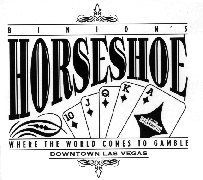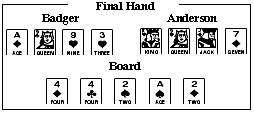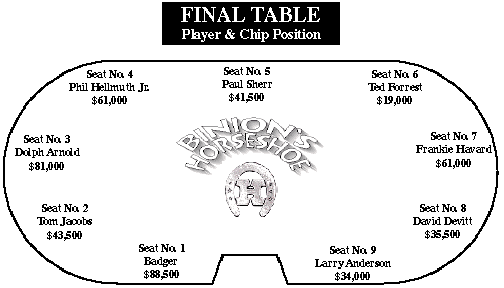

|
Volume 30 • Number 9 • May 5, 1999 |
| previous event |
| next event |
1999 Champion
STEVE BADGER
Event #9 Results
Limit Omaha Hi-Low
$2,500 Buy-in
| 1. Steve Badger | $186,000 |
| Sherman Oaks CA | |
| 2. Larry Anderson | 93,000 |
| San Jose CA | |
| 3. Paul Sherr | 46,500 |
| Phoenix AZ | |
| 4. Dolph Arnold | 27,900 |
| Houston TX | |
| 5. Phil Hellmuth Jr | 20,925 |
| Palo Alto CA | |
| 6. Tom Jacobs | 16,275 |
| Las Vegas NV | |
| 7. Frankie Havard | 11,625 |
| Tuscalusa AL | |
| 8. David Devitt | 9,300 |
| Orange Park FL | |
| 9. Ted Forrest | 7,440 |
| Las Vegas NV | |
| 10. Jonathan Brody | 5,580 |
| 11. Don Halpern | 5,580 |
| 12. Daniel Negreanu | 5,580 |
| 13. Steve Haynes | 5,115 |
| 14. Jaeggi Alphons | 5,115 |
| 15. Allen Cunningham | 5,115 |
| 16. Bill Gazes | 4,650 |
| 17. Chris Ferguson | 4,650 |
| 18. Tony Ng | 4,650 |
Total Prize Pool: $465,000
Number of Entrants: 186
Entries to Date: 2,064
Prize Money to Date: $4,565,000

Badger, who had a slight lead when the final table started, says he almost never loses in Omaha tournaments when he has the lead. Not so fortunate was Ted Forrest, whose second appearance at the last table was brief. Starting with just $19,000, he folded at the river on the first hand dealt, and on the third hand raised all in with his last $4,000, holding A-2-3-J. Only one low card hit the board, and Anderson, a prop at Bay 101, took the pot with a flush.
A few hands later there was four-way action. The board came Q-9-7/6-5. At the showdown, Anderson, Tom Jacobs and Phil Hellmuth Jr. all turned over A-2, and Anderson also made a straight. David Devitt, all in on the turn, had a K-Q-2-3. So Jacobs and Hellmuth got sixthed, but Devitt got 86thed out of the tournament.
Hellmuth then has a run of bad luck when his strong hands get outrun on the river. When his third nut flush loses to a second nut flush held by Dolph Arnold, an executive with the MGM Grand's Texas branch, he has only $11,000 left. He hangs tough and eventually goes all in and escapes with splits or scoops five times before surrendering.
At the 5 p.m. break, Badger, Anderson and Arnold are all tightly bunched with a bit over $100,000 each. With limits at $4,000-$8,000, Frankie Havard, a gambler from Pascagoula, Mississippi, gets scooped when Arnold makes a flush. Shortly after, he picks up a strong hand of A-A-3-4 and gets involved in a pot with Badger and Arnold that's raised three times before the flop. He commits all his chips, and when the smoke clears, the board shows J-10-6/2-Q. Badger, who started with a promising low hand of A-2-5-K, ends up scooping with an ace-high straight that sends Havard straight out the door.
Tom Jacobs follows him soon after. He goes in with K-K-8-3 against Anderson's A-4-5-7. The prop flops sevens and fives and a seven low, while the best that Jacobs can manage is an eight. Hellmuth is eliminated in much more spectacular fashion. He puts all his chips in for the sixth and last time, matching his premium hand of K-K-Q-J double-suited against Arnold's A-2-Q-8. Hellmuth makes a straight on a flop of A-Q-10, but a second ace on the turn gives Arnold aces full. The WSOP champ is still alive to a royal flush draw, but this isn't the movies, and the lesser flush he makes on the river isn't much consolation when he has to settle for fifth place.
Arnold himself rings up six all-in escapes, but craps out on number seven. He holds kings but can't improve, while Anderson makes a flush with two small clubs. Paul Sherr, meanwhile, who hasn't been involved in many pots, suddenly picks up a few small ones and climbs over the $100,000 mark. Then Anderson pulls slightly ahead of Badger when his trip 5s shoots down Steve's Aces and fives--but it's just the first of many chip-lead exchanges between them in the long hours yet to come. Then Sherr goes broke when he bets out his last chips with the board showing Q-10-4/J-2. After long hesitation, Anderson calls. Sherr has tens and deuces, but Anderson, even though he missed his straight, edges him with jacks and 10s.
Heads-up, Badger quickly moves into a substantial lead when he picks up a couple of sizeable pots. "I liked you better when we were friends," Anderson jokes. But it's far from over. Outchipped 6-1 at one point, Anderson regains the lead by first making three queens, then sevens full. Then the badger surges ahead and puts his opponent all in, but a diamond on the river gives the prop a winning flush.
Badger keeps hammering. Down to $26,000, Anderson gets a reprieve when he's all in and flops three kings. The end, at long last, comes more than 12 hours after the final table started. With limits at $15,000 and $30,000, Badger raises before the flop and Anderson, holding K-Q-J-7, adds his last $6,000. The board comes 4-4-2-A-2, and Badger, with A-Q-9-3, pairs his ace to finally stop the prop. As he said, when you get short-handed, sometimes all you need to win is a pair.

"If It's Not Over in 40 Minutes, You Guys Forfeit the Money"
by Andy Glazer
©1999 Andrew N. S. Glazer, all rights reserved. Used with permission. Andrew N. S. Glazer is the author of Casino Gambling the Smart Way available at most bookstores.Bring on the clowns, jugglers and dancing bears, because the three-day 1999 World Series of Poker Omaha 8 or better event had just about everything else.
If you wanted comic relief, you could find it when a heavy spectator sat on one end of the aluminum bleachers and caused the other end to explode upward, the metal rending with such a loud, violent crack that everyone in the room thought some angry player had pulled out a pistol and shot an opponent.
If you wanted tenacity, you could find it with the performances of Phil Hellmuth and Dolph Arnold, each of whom hung on for more than an hour with impossibly short stacks, each choosing flawlessly the moments to risk their final few tokens, before the odds finally caught up with each, Hellmuth going out 5th and Arnold 4th.
For each of those hours, Hellmuth and Arnold were so short-stacked, relative to the rest of the table, that they might as well have had targets painted on their chests, so often were their blinds attacked and their all-in bets checked down to the river by multiple opponents trying to swat their pesky foes. Coming back to back, the performances were astounding. It reminded me of the time I held the dice at a craps table in the Bahamas for half an hour, finally missed, turned to my friend Mark Tyrell and said, "beat that." He did, holding them for 35 minutes.
And these were just the preliminaries.
When the final table had been assembled the night before, my first thoughts were "buckle up." That's because so many top players had made it to the final: Hellmuth, Ted Forrest, Steve Badger, and Tom Jacobs, among others.
"Buckle up" proved to be the right expression, but for the wrong reason. I thought we were preparing to watch a poker tournament. Instead, it turned out to be The 24 Hours of Le Mans.
At about 8:30, after four and half hours of play, Phoenix's Paul Sherr finally succumbed to the solid play of Steve Badger and Larry Anderson. Although I'd been rooting for buddy Hellmuth and the impossible not-to-like Ted Forrest when the day began, I was happy to see Steve and Larry so near the title. Steve had, only a couple of weeks earlier, provided (on rec.gambling.poker) a very thorough and tactful analysis of where I went right and where I went wrong in the finals of the Bay 101 Shooting Star tournament. It was so educational and so gracious compared to the sniping that often goes on there that he quickly became a Glazer favorite. And Anderson was a fellow Bay 101 player (he works there as a prop in the Omaha game); we Northern California types were getting a chance to defend our honor against the legions of Southern Californians, Las Vegans, and East Coast pros who had been dominating the World Series action.
Ummm, did I say "so near the title" in that last paragraph? Sorry for the fib. Larry and Steve were still four hours of heads-up play away from the title.
Badger, an Omaha specialist who has won more major Omaha titles than anyone, very nearly put the match away in the early going. After scooping several pots he had Anderson almost all-in and ready to be scooped by a wheel when a five on the river gave Anderson fives full of threes for a split pot. Even then Anderson was in trouble, trailing $415,000-$50,000 in chips. But he battled back to even as the hour grew late.
At 11:20 p.m., a weary Tournament Coordinator Bob Thompson announced in jest that "if it isn't over in 40 minutes, you guys forfeit the money." Most of the finals at this Series had ended far, far earlier than this.
When the blinds increased to $10,000 and $15,000, Badger rearranged his chips (which he'd been keeping in stacks of $20,000) into stacks of $15,000 to facilitate the betting. Keeping them in double rows, his chip lead started to grow again, and the long line of chips started looking like a Maginot Line, protecting Badger from Anderson's attacks. It stretched nearly from one corner of the table to the other.
History repeated itself when Steve's Maginot Line quickly suffered a fate similar to France's "impenetrable barrier." (To those of you who cut History class to play cards, the Maginot Line was probably the dumbest strategy in military history. The French built a long wall of fortifications, which, they were quite sure, would protect them from any German attack during WWII. They neglected to consider that the Germans would just go around the end of this wall and France fell almost as fast as the spectator who broke the aluminum bleachers.)
Steve's barricade contained about 5/6 of the chips, and in heavy betting action all of Larry's chips joined the fray, but when a diamond fell on the river, Steve's two pair succumbed to a flush and suddenly Anderson had gone from the felt to owning a third of the chips.
Exactly the same thing happened on the very next hand: heavy betting action, Steve in the lead until the river, and this time an eight fell on the river, pairing an eight already on the board and giving Larry three eights; once again, two flopped pair were shot down by Baron Von Anderson (sorry I'm mixing my World War metaphors). Once again the Maginot Line had crumbled.
In two hands Anderson had gone from the brink of elimination to owning two-thirds of the chips.
"I told myself, just don't get stupid," Badger later explained. "It was kind of stunning to lose that many chips on two consecutive river pots, but I still had plenty of chips and I knew if I didn't panic I'd be OK."
Meanwhile, the crowd had been drifting in and out. The bleachers had been packed early, the star-studded table an obvious attraction. As the hour grew late, many departed, but as the match dragged on and on, the bleachers grew full again, no doubt with the morbid curiosity of those gathering around a traffic accident. Everyone wanted a look at these two bloodied warriors, who had been whacking each other with every available weapon for hours, each unwilling to blink or back down.
And like the morbidly curious, they soon drifted away, having seen the ugliness and realizing they wanted no part of it, departing glad that they were casual witnesses and not among those trapped in the wreckage.
Midnight came and went, turning the event into a three-day tournament, and still the two combatants fired away. By this time Badger had consumed about 38 bottles of water, and when I added in all the plastic trashed by his opponents and the spectators, I estimated that the petrochemicals used to create the plastic that had contained all this liquid probably cost the lives of four or five large dinosaurs and a couple dozen velociraptors. When this thought entered my delirium at 12:15, I was starting to think that trading in the empty receptacles for the velociraptors, and letting them tear the casino to shreds, might be a merciful way to end this battle.
By this point, the blood in my veins had been replaced entirely by coffee. Had I suddenly been needed to give a transfusion to a surgical patient, I'm sure he would have awakened in the middle of the operation.
Even the Energizer Bunny gave out. Badger took off his Walkman headphones and announced that the batteries have quit. Fortunately he carries spares; he replaces the batteries and can continue to listen to music rather than the groans of the spectators.
Badger takes the lead again and with Anderson down to two stacks, he pleads, to no one in particular, "please, a no-brainer." He might have it! Anderson is all-in for his last $26,000. But his two kings double him through to $52,000 as the remaining spectators start to chant "Larry, Larry, Larry!"
This cry attracts more spectators, and they see Anderson go all-in before the flop holding Kd-Qd-Jd-7d, while Badger holds Ad-Qc-9h-3h. The flop comes 4d-4c-2s; Larry is in trouble, with Steve's Ace still the high hand and his A-3 threatening both a low and a wheel. An Ace falls on the turn and some dirty rotten Johnny-come-lately spectator whose brains are still functioning yells, "it's over!" Thanks to the paired Ace, Larry has no outs, and the final deuce is indeed irrelevant.
Reporters clustered around Badger, while a spectator asks him if he can hold the bracelet.
"Sure," Steve says, handing it to him. "Try to make a break for it, though, and you'll never walk again." Coming from this burly, powerful 40-year old, the threat behind the jest seems real enough.
Asked why he's so much better at Omaha than other games, Steve explains that "the game has so little imagination that I'm perfect for it!" He laughs and continues the explanation. "It's mostly mathematical until it shifts to higher stakes or gets short- handed, and then it changes from a game of straights and flushes to a game of pairs. You've got to be able to feel when that shift occurs."
And what about the treasured bracelet, the gold trinket which he loaned so cautiously to the inquiring spectator? "I'm glad to get it," he said, "but it isn't as important to me as the money ($186,000). The prize pool was more important to me." He paused to reflect. "I've never had money, this is the most money I've ever had in my life."
You earned it, Steve, you earned it. It wasn't even bad as an hourly rate, and for this marathon, that's saying something.
